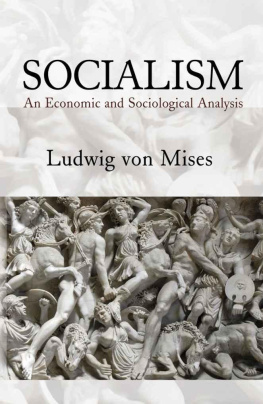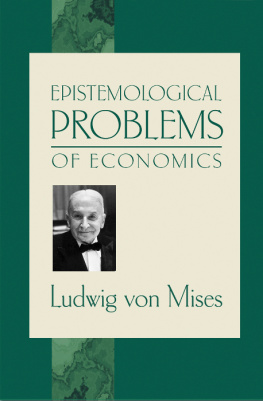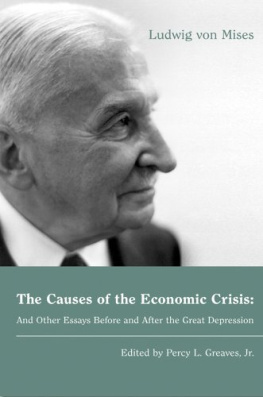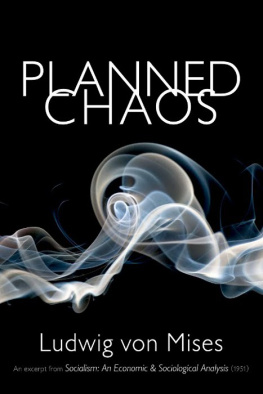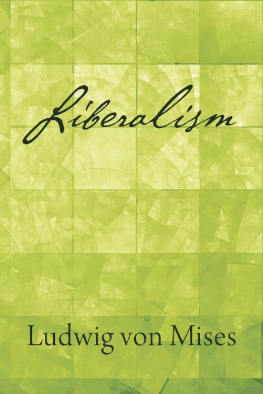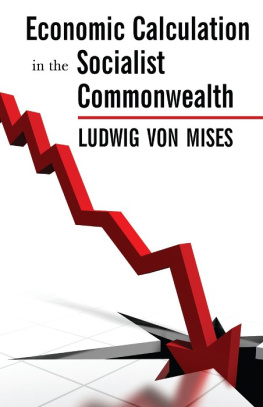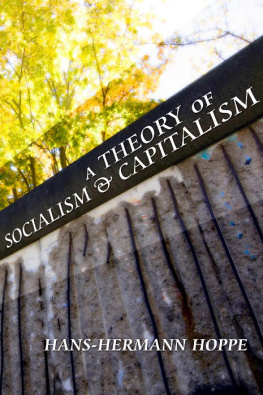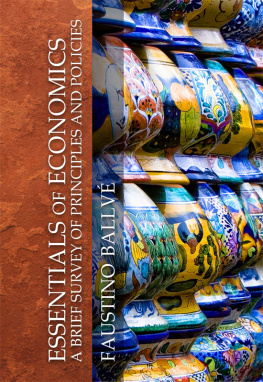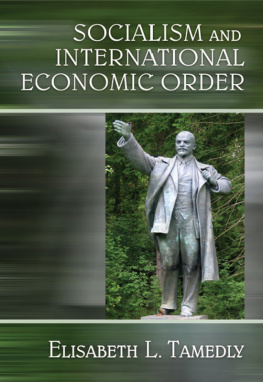Von Mises - Socialism: An Economic and Sociological Analysis
Here you can read online Von Mises - Socialism: An Economic and Sociological Analysis full text of the book (entire story) in english for free. Download pdf and epub, get meaning, cover and reviews about this ebook. year: 2009, publisher: Ludwig von Mises Institute, genre: Politics. Description of the work, (preface) as well as reviews are available. Best literature library LitArk.com created for fans of good reading and offers a wide selection of genres:
Romance novel
Science fiction
Adventure
Detective
Science
History
Home and family
Prose
Art
Politics
Computer
Non-fiction
Religion
Business
Children
Humor
Choose a favorite category and find really read worthwhile books. Enjoy immersion in the world of imagination, feel the emotions of the characters or learn something new for yourself, make an fascinating discovery.
Socialism: An Economic and Sociological Analysis: summary, description and annotation
We offer to read an annotation, description, summary or preface (depends on what the author of the book "Socialism: An Economic and Sociological Analysis" wrote himself). If you haven't found the necessary information about the book — write in the comments, we will try to find it.
Von Mises: author's other books
Who wrote Socialism: An Economic and Sociological Analysis? Find out the surname, the name of the author of the book and a list of all author's works by series.
Socialism: An Economic and Sociological Analysis — read online for free the complete book (whole text) full work
Below is the text of the book, divided by pages. System saving the place of the last page read, allows you to conveniently read the book "Socialism: An Economic and Sociological Analysis" online for free, without having to search again every time where you left off. Put a bookmark, and you can go to the page where you finished reading at any time.
Font size:
Interval:
Bookmark:
SOCIALISM AND ETHICS
The socialist attitude to ethics
FOR pure Marxism Socialism is not a political programme. It does not demand that society shall be transformed into the socialist order, nor does it condemn the liberal order of society. It presents itself as a scientific theory which claims to have discovered in the dynamic laws of historical development a movement towards the socialization of the means of production. To say that pure Marxism pronounces itself in favour of Socialism or that it desires Socialism or wishes to bring it about would be just as absurd as to say that Astronomy wishes or thought it desirable to bring about a solar eclipse which it had predicted. We know that Marx's life and even many of his writings and sayings sharply contradict his theoretic outlook and that the Socialism of resentment is always showing its cloven hoof. In practical politics at least, his supporters have long since forgotten what they owe strictly to his doctrine. Their words and deeds go far beyond what the accoucheur theory permits. This, however, is of secondary importance for our study, which here deals only with the doctrine pure and undefiled.
Besides the pure Marxist view that Socialism must come of inexorable necessity, there are two other motives which guide the advocates of Communism. They are socialists either because they expect socialist society to increase productivity, or because they believe that a socialist society would be more just. Marxism is unable to reconcile itself to ethical Socialism. But its attitude to economic-rationalist Socialism is quite different: it is possible to interpret the materialistic conception of history as meaning that the trend of economic development naturally leads to the most productive type of economy, that is to say Socialism. Of course, this view is very different from that held by the majority of marxists. They are for Socialism, firstly because it is bound to come in any case, secondly because it is morally preferable, and finally because it involves more rational economic organization.
The two motives of non-marxian Socialism are mutually exclusive. If a man advocates Socialism because he expects it to increase the productivity of social labour he need not try to bolster up his demands with a higher moral valuation of the socialist order. If he elects to do so, he is open to the question whether he would be prepared to advocate Socialism if he discovered that it was after all not the morally perfect order. On the other hand it is clear that one who advocates the socialistic order for moral reasons would have to go on doing so even if he were convinced that the order based on private ownership in the means of production yielded greater productivity of labour.
Eudemonistic ethics and Socialism
To eudemonism, which looks at social phenomena rationalistically, the very way in which ethical Socialism states its problems seems unsatisfactory. Unless Ethics and Economy are regarded as two systems of objectivization which have nothing to do with each other, then ethical and economic valuation and judgment cannot appear as mutually independent factors. All ethical ends are merely a part of human aims. This implies that on the one hand the ethical aim is a means, in so far as it assists in the human struggle for happiness, but that on the other hand it is comprised in the process of valuation which unites all intermediate aims into a unitary scale of values and grades them according to their importance. The conception of absolute ethical values, which might be opposed to economic values, cannot therefore be maintained.
Of course one cannot discuss this point with the ethical a priori- ist or the intuitionist. Those who uphold the Moral as ultimate fact, and who rule out scientific examination of its elements by referring to a transcendental origin, will never be able to agree with those who are dragging down the concept of Right into the dust of scientific A priori ethics, claiming unconditional validity for its norms, approaches all earthly relations from the outside and aims at transmuting them into its own form with no concern whatever for the consequences. Fiat iustitia, pereat mundus is its motto, and it is when it becomes honestly indignant about the eternally misunderstood plea, the end justifies the means, that it is most sincere.
Isolated man settles all his ends according to his own law. He sees and knows nothing but himself and arranges his actions accordingly. In society, however, he must temper his actions to the fact that he lives in society and that his actions must affirm the existence and progress of society. From the basic law of social life it follows that he does not do this to achieve aims lying outside his own personal system of ends. In making the social ends his own he does not thereby subordinate his personality and his wishes to those of a higher personality or renounce the fulfilment of any of his own desires in favour of those of a mystical universe. For, from the standpoint of his own valuation, social ends are not ultimate but intermediate in his own scale of values. He must accept society because social life helps him to fulfil his own wishes more completely. If he denied it he would be able to create only transitory advantages for himself; by destroying the social body he would in the long run injure himself.
The idea of a dualism of motivation assumed by most ethical theorists when they distinguish between egoistic and altruistic motives of action, cannot therefore be maintained. This attempt to contrast egoistic and altruistic action springs from a misconception of the social interdependence of individuals. The power to choose whether my actions and conduct shall serve myself or my fellow beings is not given to me which perhaps may be regarded as fortunate. If it were, human society would not be possible. In the society based on division of labour and co-operation, the interests of all members are in harmony, and it follows from this basic fact of social life that ultimately action in the interests of myself and action in the interest of others do not conflict, since the interests of individuals come together in the end. Thus the famous scientific dispute as to the possibility of deriving the altruistic from the egoistic motives of action may be regarded as definitely disposed of.
There is no contrast between moral duty and selfish interests. What the individual gives to society to preserve it as society, he gives, not for the sake of aims alien to himself, but in his own interest. The individual, who is a product of society not only as a thinking, willing, sentient man, but also simply as a living creature, cannot deny society without denying himself.
This position of social ends in the system of individual ends is perceived by the individual's reason, which enables him to recognize aright his own interests. But society cannot always trust the individual to see which are his true interests. If it left everyone to judge of his own it would expose itself to the caprice of every foolish, sick, and weak-willed person, leaving him free to put its very existence into question, thus imperilling the continuity of development. This is what led to the creation of powers of social coercion which, vis--vis the individual, appear as external constraints because they demand imperative obedience. And here we see the social significance of the State and the Law. They are not something outside the individual, demanding from him actions which run counter to his own interests, forcing him to serve alien purposes. They merely prevent the misguided, asocial individual, blind to his own interests, from injuring his fellow men by a revolt against the social order.
It is therefore absurd to maintain that Liberalism, Utilitarianism and Eudemonism are inimical to the State. They reject the idea of Etatism, which under the name State adores as God a mysterious being not comprehensible to human understanding; they dissent from Hegel, to whom the State is divine will; they reject the Hegelian Marx and his school who have replaced the cult of State with the cult of Society; they combat all those who want the State or Society to perform tasks other than those corresponding to that social order which they themselves believe the most proper to the end in view. Because they favour private ownership in the means of production they demand that the State coercive apparatus shall be directed to maintain this, and they reject all proposals intended to restrict or abolish private property. But never for a moment do they think of abolishing the State. The liberal conception of society by no means omits the apparatus of the State; it assigns to this the task of safeguarding life and property. Anybody who calls opposition to State railways, State theatres, or State dairies enmity to the State must be deeply enmeshed indeed in the realistic (in the scholastic sense) conception of the State.
Font size:
Interval:
Bookmark:
Similar books «Socialism: An Economic and Sociological Analysis»
Look at similar books to Socialism: An Economic and Sociological Analysis. We have selected literature similar in name and meaning in the hope of providing readers with more options to find new, interesting, not yet read works.
Discussion, reviews of the book Socialism: An Economic and Sociological Analysis and just readers' own opinions. Leave your comments, write what you think about the work, its meaning or the main characters. Specify what exactly you liked and what you didn't like, and why you think so.

